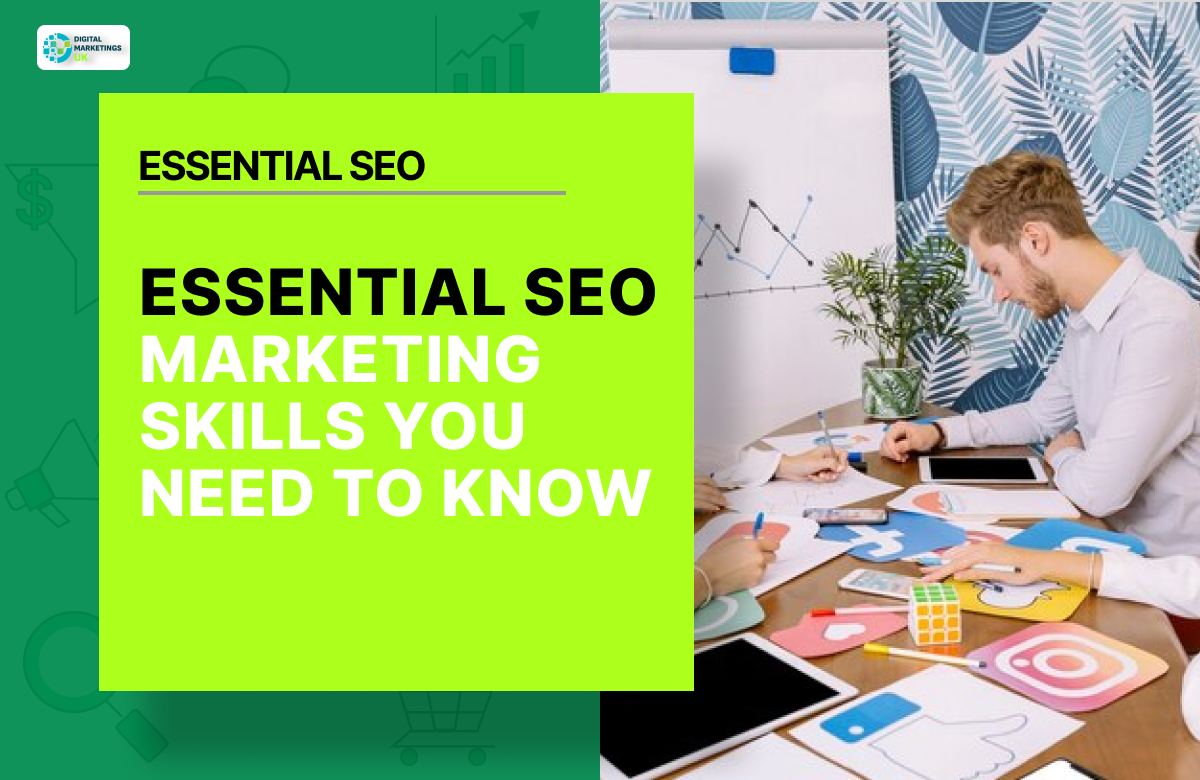During the constant wars of internet advertising, Search Engine Optimization (SEO) is one of the crucial methods for companies which would like to enhance their positions online. To any company operating within the United Kingdom, SEO marketing should not be seen from the frame of getting more people into your site, but rather, the quality of the viewers and their perceived relevance to your company’s goods or services, conversion rates, and brand reputability. SEO skills are relevant for business people, marketers, and SEO practitioners hence the need to learn and master. In this article, you will discover the most important SEO marketing skills of today’s dynamic digital market environment that you need to embrace.
Keyword Research and Analysis
Keywords are the foundation of any good SEO plan and you must always begin your campaign by searching for keywords. They mean the process of finding the keywords and phrases that the potential audience could be using to look for your products or services. If you now know that these keywords are searched to find let’s say ‘how to’ guides, you’d be able to tailor your content to fit the needs of your audience.
Keyword research goes beyond identifying high-traffic keywords for a website. It also includes a check on keyword difficulty and that of its competition level. There are free tools available for conducting keyword research is Google Keyword Planner, Ahrefs, and SEMrush. And Uber suggest to unearth highly beneficial keywords that are best suited to your business model. Additionally, choosing such long-tail keywords as special, unique, and rather niche. You can force more unique traffic on the site which leads to increased conversion.
On-Page SEO Optimization
On-page SEO is how you can improve the website’s pages to rank better in the search engine results and be more useful to visitors. Key elements of on-page SEO include:
Title Tags & Meta Descriptions: Creating new and relevant title tags and meta descriptions requires special attention. The former is normally the clickable part of any site that the user first encounters when they are browsing through search engine results.
Header Tags (H1, H2, H3, etc.): Header tags if formatted correctly help the search engines to determine the order of the information on the page you are viewing. They also help to make the page more readable for users, which is an aspect that has perhaps not been fully attained by developers.
Content Optimization: It is also important that your content must be informative, interesting and contain a good number of relevant keywords but not heavily keyworded. Google sees quality, unique content that answers the queries people are typing into the search engine as valuable.
Internal Linking: Internal linking also assists the search engines to crawl through your site effortlessly, and the orientation of information to be logical. It also enhances the ease of use of the application and the time spent on a session.
URL Structure: Cleanse and easy-to-understand URLs with target keywords often have a positive impact on the rankings and usability of a website.
Technical SEO
Technical SEO is concerned with those parts of your site that are not immediately visible to the users but are visible to the search engine bots. These include factors such as site speed, mobile—friendliness, Crawlability and site architecture. Some key technical SEO skills to develop include:
Site Speed Optimization: A key factor in the ranking of sites is the speed of page loading. In particular, the websites that take little time for their loading are easier to use and desired by such search engines. Page speed and performance can be diagnosed using Page Speed Insights, GT Metrix and Lighthouse.
Mobile Optimization: Since the increase in user interest in Web browsing through the use of mobile devices, Google provides mobile-first indexing. Mobile-friendly websites are crucial in today’s business world and they play a huge role in SEO.
XML Sitemaps: An XML sitemap is a document that allows selectors to find out the structure of a given website more easily. Paid members also benefit from the commercial facilities. They can make changes to their sitemaps for the betterment of their site’s crawlability.
Canonical Tags: Applying canonical tags just doesn’t allow to production of copies of the site pages, which affects ranking.
Link Building and Off-Page SEO
As for the off-page SEO, this primarily relates to link building which means the process of getting the backlinks on other reputable websites. These backlinks also serve as referrals to your site to other sites as this shows search engines that the content you post is real. Here at Digital Marketings UK, we focus on creating an ideal link-building plan to increase your website’s credibility with the public.
To build a strong backlink profile, you need to focus on:
Content Marketing: This involves developing topical, valuable shareable content. Such as Infographics, blogs, and research articles encouraging other sites to link back to your site.
Guest Blogging: Every now and then, contributing a guest blog on blogs that are authoritative of your given industry makes for good backlinks. While at the same time popularizing your brand.
Influencer Outreach: As you work with influencers or thought leaders in your domain. You’ll be able to garner backlinks from reputable domains.
Broken Link Building: Other methods which can be used include searching for broken links on other sites. And then providing an innovative link that can be of importance to the user.
SEO Analytics and Reporting
A common activity is to avoid knowing and monitoring the results of your work in the field of SEO permanent improvements. It helps you make appropriate adjustments and improvements to your approach reaching your target audience and knowing how your website ranks. Where your traffic is coming from and how users are engaging with your website. Analytics platforms, Google Analytics and Google Search Console, Ahrefs, and SEM rush give information on the keywords and their performance, the organic traffic, the bounce rates, etc. It is crucial here to remember that it is imperative to review these metrics frequently and update your SEO strategy ultimately.
Local SEO of SEO Marketing
Businesses in the UK need Local SEO marketing. It is important to ensure your business pops up in a local search outcome which is well-suitable. If you are aiming your business at a certain geographical area.
Key components of local SEO include:
Google My Business (GMB): To increase your visibility in the GMB it is recommended to make sure that all necessary business information is provided. And up to date, photos, reviews and updates are refreshed regularly.
Local Citations: Providing up-to-date information for name, address and telephone number in local business listings including Yelp. Yell and other local directories in the UK fuel your local SEO.
Localized Content: There is also the advantage of using region-of-interest SEO services UK that your business creates; such keywords will attract local customers.
SEO Content Writing
Content remains king in SEO. It is impossible nowadays to overstate the value of writing search engine-friendly copy that also makes for good reading. Such content may include blog articles, landing page copy, product descriptions and other web copy. High-quality content means well-written content which includes preference for keywords. And it must provide answers to the queries of prospective clients. In addition, such additions as images, videos or infographics improve user experience. And increase the amount of time spent on the page, which also contributes to SEO.
Wrap Up
SEO marketing is a field that requires the combination of technical skill, creativity, professionalism, and a testament to acquiring higher-level practices and techniques that Digital Marketings UK possesses. By gaining knowledge on keyword research, on-page SEO, technical SEO, links, local SEO and content writing. You stand to improve the ranking of your website on the various search engine listings. And hence attract more and more targeted traffic to your business in the cutthroat competitive market of UK digital.



